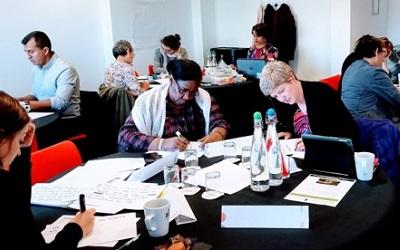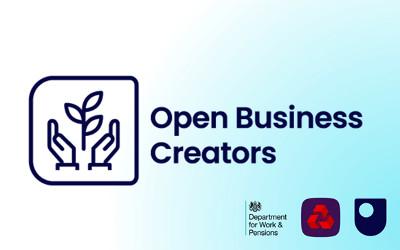Day 204, Year of #Mygration: Developing a model for open learning by refugees and refugee-support organisations

Today's post comes from Gabi Witthaus, Director of Art of E-Learning. Gabi is an external consultant who is supporting the OU with its Refugees' Educational Resources Project.
There are thousands of free informational and educational resources available online targeted at refugees and asylum seekers, and yet there is no information widely available about how these resources are being used or whether they are fit for purpose. The Open University (OU) is addressing this research gap through the Refugees' Educational Resources Project (RefER), a joint collaboration between OU Scotland and the OU's Research Network in International Development and Inclusive Innovation. A small team from Art of E-learning (Alastair Creelman, Brenda Padilla and myself) have been tasked with conducting an evaluation of the free, online learning resources that are available to refugees in the UK, to help the OU identify how it can support gaps in resources. (Terminology note: I am using the term "refugees" here as a shorthand to include both refugees and asylum seekers.) RefER is funded as part of the OU’s Year of ‘Mygration’, marking 2018 as the year leading up to its 50th anniversary next year.
On 28th September, a group of us met in Glasgow to workshop ideas for further developing the pool of existing free, online learning resources that are aimed at both refugees and the frontline staff and volunteers who support refugees in the UK. The group included members of organisations serving refugees, and members of the RefER project team. We discussed key points emerging from the data gathered so far (see my workshop slides), and our responses to these points. The discussion became animated as we considered the apparently insurmountable obstacles that many refugees face in starting a new life for themselves in the UK, integrating socially, and finding employment. The OU team lived up to its reputation for openness in listening carefully to a range of opinions and suggestions from the participants - more about that below...
The OU team lived up to its reputation for openness in listening carefully to a range of opinions and suggestions from the participants
The RefER project - what we've learnt so far
We have gathered data from people working in organisations supporting refugees across the UK via a survey, follow-up emails from survey respondents and interviews. Based on these inputs, as well as our own desktop research, we have compiled a 'Resources audit' with links to over 500 free, online resources (around 200 aimed at refugees, and around 300 aimed at staff and volunteers). The topics that these resources address include (amongst other topics):
-
For refugees - English for Speakers of Other Languages (ESOL), digital literacy, and study skills, as well as information about citizenship, and national/ local/ regional services and regulations.
-
For staff and volunteers - issues related to working in the voluntary sector, inclusion and equality, ESOL teaching, working with youth, marketing for volunteers, and information on migration policy and human rights law.
The key themes emerging from the survey, interviews and emails with research participants are summarised below:
-
There is, predictably, great diversity (linguistic, cultural, educational and technical ability) amongst the refugee population in the UK.
-
Language barriers are sometimes severe, and there is no universally understood labelling system for online learning resources (e.g. "introductory level English" may refer to first-year University level).
-
Smartphones are used almost universally for accessing the internet, as opposed to tablets or desktop computers. However, data is costly, and phones may be outdated.
-
Online resources are often perceived to include cultural bias.
-
Resources in audio or video format are helpful, and subtitles are greatly valued.
-
Some refugees are unwilling to go online for fear of being monitored, tracked or deported.
-
Online learning is often not seen as "real learning".
-
Staff and volunteers working for organisations also have wide-ranging experience and levels of expertise with technology.
-
There is a general lack of training opportunities for staff and volunteers.
-
Staff and volunteers demonstrate dedication and kind-heartedness way beyond the call of duty; however, they are themselves aware that they may be making false assumptions about the needs and lives of the refugees they are supporting. (This was a persistent theme through the data, and indeed throughout the discussion at the workshop.)
Meeting the challenges - workshop discussion
In view of the fact that there is already a substantial pool of free learning resources available online, it was agreed that the gap to be addressed is not in resources per se, but in support for both refugees and organisations to make better use of the existing resources. Our discussion about how to meet this need centred around the development of two possible massive open online courses (MOOCs):
-
A MOOC aimed at staff and volunteers of organisations that support refugees, with the purpose of helping these frontline workers to support refugees to learn online.
-
A MOOC aimed at both frontline workers and refugees, aimed at facilitating a culture of co-curation and co-creation between the two audiences, so that both are empowered to find, adapt, or create appropriate learning resources for their specific needs and contexts. (This MOOC was nicknamed the “CoCo” MOOC.)
The second idea received more attention in the meeting than the first, largely because of the general agreement with the finding that staff and volunteers are so often not in a position to determine the content, or even the communication style and format, of resources for their clients. (See point 10 under key themes above.) It was also clear, by implication, that the Open University team itself would need input and guidance from people with refugee backgrounds in order to successfully lead others in such an endeavour. We discussed a few concrete ways in which this might be achieved - one of which was to look for those “brokers” amongst the staff and volunteers of refugee-support organisations, who themselves have a refugee background. We also took heed of the challenge from some participants to never simply accept common assumptions at face value - for example, the idea that refugees have to first master English before they can find meaningful employment. (Examples of specific cases were given to disprove this notion.) There was also a strand of discussion emphasising that whatever intervention the OU offers, it should ensure that refugees are not framed as victims of circumstance, needy people, service users, and so on, but that we should actively challenge these stereotypes by inviting refugees to be partners in shaping the intervention.
Next steps
For me, it was very encouraging to be a part of such a discussion, in which the “powerful” party (the OU) showed such a sincere and keen interest in being part of a solution that addresses deep and difficult problems, rather than responding to superficially identified needs in a formulaic way. We did not come up with “the solution” in this workshop, but we did make some progress towards identifying the problem to be solved. The next steps will involve the RefER project team writing up the final report for internal review, and this will later be disseminated widely by the OU. In the meantime, we would appreciate any comments from interested readers, as any feedback we receive before the end of October can be incorporated into the final report. In conclusion, I would like to thank my colleagues from the OU, and the participants at the workshop, for a challenging but uplifting discussion, and I look forward to seeing this project unfold, with the help of the wider refugee and refugee-support community.
Contact our news team
For all out of hours enquiries, please telephone +44 (0)7901 515891
Contact detailsNews & articles

Grant recipients announced for the 2025 Open Business Creators Fund for Women in Business
The businesses selected to receive funding from the Open Business Creators Fund for Women in Business, (delivered by The Open University and sponsored by NatWest) have been announced.